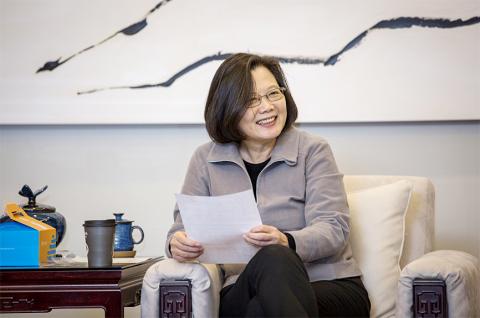President Tsai Ing-wen (蔡英文) on Friday said that her administration would double down on transitional justice and judicial reform, adding that protecting the nation’s democratic institutions from foreign electoral interference is on the agenda for next year.
“We are not balking from reform,” Tsai said, adding that setbacks to policy do not affect her determination to phase out nuclear power, or to oversee the implementation of judicial reform and transitional justice.
“Although transitional justice has encountered difficulties, we will adjust our approach and get the policy back on track,” she said at an informal session with reporters at her residence in Taipei.

Photo: CNA, courtesy of the Presidential Office
Regarding judicial reform, Tsai said that the nation would soon have to decide whether the courts are to adopt citizen judges, juries, or another system with elements from both, and the legislature would play a large role in that decision.
Major legislative initiatives — including the Labor Dispute Act (勞動事件法) that recently passed the legislature and the proposed “grand chamber” system — were the result of last year’s National Congress on Judicial Reform, she said.
“People will soon understand that the core issues of judicial reform are being addressed,” she said.
Although many have been disappointed by the seemingly slow pace of judicial reform, the speed of reform necessarily reflects the immensity of the problems being confronted, she said.
Broadening citizen participation in the justice system through citizen judges or trials by jury would help address issues of the courts often failing to meet public expectations with judgements, she said.
Whichever solution is adopted, reforms would enact profound changes to how the Taiwanese litigate and usher in a new age for the justice system, she said.
Asked to comment on debate over division of authority for the president and the premier, Tsai said: “There are certain ambiguities in our constitutional framework.”
Historically, an administration relies on smooth cooperation between the president and the premier to make policy, she said, adding that some issues had occurred in her administration despite the largely smooth cooperation between herself and her premiers.
“Many Taiwanese academics base their opinions on the political experience of foreign nations, which is less important than the nation’s own experience,” she said.
The government hope to evaluate the constitutional issues of the past decade and discuss solutions, an effort supported by the Democratic Progressive Party and its think thank, she said.
Last month’s elections have stoked fears that China could interfere with elections using disinformation, which must be considered “a direct challenge to our democratic institutions,” she said.
The government will rise to the challenge with a series of policies and ideas that will improve and protect democratic institutions from foreign meddling, she said, adding that national security issues would claim an important place in her agenda for next year.

Chinese Nationalist Party (KMT) Chairman Eric Chu (朱立倫), spokeswoman Yang Chih-yu (楊智伃) and Legislator Hsieh Lung-chieh (謝龍介) would be summoned by police for questioning for leading an illegal assembly on Thursday evening last week, Minister of the Interior Liu Shyh-fang (劉世芳) said today. The three KMT officials led an assembly outside the Taipei City Prosecutors’ Office, a restricted area where public assembly is not allowed, protesting the questioning of several KMT staff and searches of KMT headquarters and offices in a recall petition forgery case. Chu, Yang and Hsieh are all suspected of contravening the Assembly and Parade Act (集會遊行法) by holding

PRAISE: Japanese visitor Takashi Kubota said the Taiwanese temple architecture images showcased in the AI Art Gallery were the most impressive displays he saw Taiwan does not have an official pavilion at the World Expo in Osaka, Japan, because of its diplomatic predicament, but the government-backed Tech World pavilion is drawing interest with its unique recreations of works by Taiwanese artists. The pavilion features an artificial intelligence (AI)-based art gallery showcasing works of famous Taiwanese artists from the Japanese colonial period using innovative technologies. Among its main simulated displays are Eastern gouache paintings by Chen Chin (陳進), Lin Yu-shan (林玉山) and Kuo Hsueh-hu (郭雪湖), who were the three young Taiwanese painters selected for the East Asian Painting exhibition in 1927. Gouache is a water-based

Taiwan would welcome the return of Honduras as a diplomatic ally if its next president decides to make such a move, Minister of Foreign Affairs Lin Chia-lung (林佳龍) said yesterday. “Of course, we would welcome Honduras if they want to restore diplomatic ties with Taiwan after their elections,” Lin said at a meeting of the legislature’s Foreign Affairs and National Defense Committee, when asked to comment on statements made by two of the three Honduran presidential candidates during the presidential campaign in the Central American country. Taiwan is paying close attention to the region as a whole in the wake of a

OFF-TARGET: More than 30,000 participants were expected to take part in the Games next month, but only 6,550 foreign and 19,400 Taiwanese athletes have registered Taipei city councilors yesterday blasted the organizers of next month’s World Masters Games over sudden timetable and venue changes, which they said have caused thousands of participants to back out of the international sporting event, among other organizational issues. They also cited visa delays and political interference by China as reasons many foreign athletes are requesting refunds for the event, to be held from May 17 to 30. Jointly organized by the Taipei and New Taipei City governments, the games have been rocked by numerous controversies since preparations began in 2020. Taipei City Councilor Lin Yen-feng (林延鳳) said yesterday that new measures by